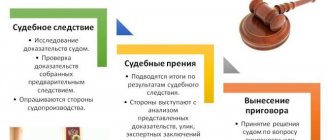The special procedure for considering a criminal case is a kind of criminal “simplification”. The procedure is accelerated due to the fact that many actions related to the need for competition between the prosecution and defense remain outside the scope of the proceedings.
Adversarialism disappears because the accused admits his guilt or begins to cooperate with the investigation. And although the law seems to accommodate those who promote justice, is such consideration really beneficial for the accused himself?
The facts and thoughts presented in the article will definitely help you understand what the special procedure for considering criminal cases is. Perhaps they will even help you figure out whether this is necessary in your particular case.
However, each case is individual, and when resolving this issue you should be guided by the advice of an experienced lawyer and, ultimately, by your own head. If you have not yet found a specialist who will defend you in court, we recommend that you do so as soon as possible.
Do you want to figure it out, but don’t have time to read the article? Lawyers will help
Entrust the task to professionals. Lawyers will complete the order at the cost you specify
23 lawyers on RTIGER.com can help with this issue
Solve the issue >
Special procedure for considering a criminal case: what is it?
The criminal process involves competition between the prosecution and defense. The goal is to find out whether the defendant is guilty of a specific crime.
This is one of the differences from civil proceedings: the latter may not be adversarial (writ proceedings), and it does not matter here whether you are really guilty or not. If you want to satisfy the plaintiff’s demands, even if you simply don’t want to argue, please, no one will interfere.
In legal proceedings regulated by the rules of the Code of Criminal Procedure, this is not the case: if you plead guilty, voluntarily taking on someone else’s guilt, the court will not pronounce a guilty verdict, not being sure of the fairness of such a decision. That is, the goal here is not to resolve the dispute, but rather to get to the bottom of the truth and assign a fair verdict (ideally).
Knowing this, it is easier to understand the phenomenon of the special procedure for considering a criminal case in the court of first instance, established in 2009 by Section 10 of the Criminal Procedure Code.
It is assumed that there are 2 procedures for entering into such proceedings: the consent of the accused with the charge brought against him and the conclusion of a pre-trial agreement on cooperation between the defense and prosecution (Chapters 40 and 40.1 of the Code of Criminal Procedure, respectively).
But the principle is the same: the accused admits his guilt (directly or indirectly, as in the case of a pre-trial agreement) in exchange for some mitigation of the sentence, which significantly facilitates and speeds up the work of the court and the burden on the judicial system as a whole.
The court does not delve into the details of the case, does not examine evidence and circumstances (except, for example, those that characterize the personality of the accused), since the parties refuse to compete.
That is why the consent of each party involved is important here. A special procedure in criminal cases does not apply to minors due to their incapacity. Also, in both cases, the defendant is exempt from paying court costs. To better understand how one procedure differs from another, we will consider each separately.
What is comprehensive legal support?
- Initial qualified legal advice on special proceedings.
- Legal advice on a specific case.
- Assessment of the situation and prospects for legal proceedings. Determination of tactics suitable for conducting a given business.
- Drawing up an application according to all the rules.
- Assistance in collecting documents that will be required in the legal process.
- Providing a package of documents for consideration:
- in a court;
- in another state organ
No competent and honest lawyer can guarantee 100% success. However, the client can be confident that a highly qualified civil lawyer will do everything possible to ensure that his employer's claim is satisfied.
Special procedure due to the accused’s admission of guilt
The special procedure for considering a criminal case due to the accused’s admission of guilt is regulated by Articles 314–317 of the Code of Criminal Procedure. Such consideration is available exclusively at the initiative of the defendant, which is logical. However, it is not always possible to admit your guilt and ask for a special procedure.
The Code of Criminal Procedure states that for this to happen, the crime with which the person is accused should not be classified as particularly serious. The wording of Article 314 does not concern the category of the crime, but the maximum possible sentence for it - 10 years. And this category includes crimes of minor gravity, moderate gravity and serious ones, according to Article 15 of the Criminal Code of the Russian Federation.
The second condition is the presence of consent to the transition to this order of the prosecution: the state prosecutor (prosecutor), the victim and the private prosecutor, who is the victim in cases of private and private-public prosecution (this can be slander, violence, beatings, bodily harm without loss to the victim ability to work and others).
And the legislator especially emphasized: the accused must take this step voluntarily, after consulting with his defense attorney, and must be aware of the nature and consequences of his petition.
And the consequences of such a petition are serious: a conviction. This is the only outcome for a criminal case, which is considered in a special manner. It would seem that you can appeal. But the scope of appeal is significantly narrowed: you will not be able to challenge the court’s conclusions based on factual circumstances, and in fact, you will not be able to change the verdict of guilty to acquittal.
Available grounds for appeal in an appeal under Article 389.15 of the Code of Criminal Procedure: violation by the judge of the rules of the Code of Criminal Procedure, incorrect application of the rules of the Criminal Code, imposition of an unfair sentence. This means that you can potentially only get a reduced sentence, but nothing more.
It is important to note here that the court, having reasonable suspicions of the innocence of the accused, can cancel the special procedure for considering a criminal case and move on to a general one. The latter, in turn, has at least two possible outcomes: a conviction or an acquittal.
The court will also deny a request for a special procedure if the special conditions set out above are not met. Replacement with the general order occurs not only at the initiative of the court, but also at the request of the accused himself, the prosecutor or the victim (that is, before the verdict is passed, you can change your mind).
The petition is submitted during familiarization with the case materials, which will be noted in the protocol of the procedure, or during the preliminary hearing, if it cannot be done without it (rules of Article 229 of the Code of Criminal Procedure).
If they begin to consider a case in a special order, then they take the general order as a basis and change it slightly.
Firstly, consideration without the accused and his defense attorney is not allowed. The procedure for the meeting is as follows:
- the accusation is announced (by the prosecutor or private prosecutor);
- the judge finds out whether the defendant understands the charge, whether he agrees with it, whether he wants to move to a special procedure, whether he understands what this will mean for him;
- aggravating and mitigating circumstances are examined, as well as those that make it possible to determine the personal qualities of the defendant (although they may not be examined);
- a guilty verdict is pronounced and the right to appeal is explained - only if no one objects and the court has enough evidence of the person’s guilt.
Many defendants who agree to a special procedure in a criminal case make this choice based on the fact that judges in this case do not have the right to impose more than two-thirds of the punishment (term, fine, etc.). However, is this really something worth admitting guilt for?
Practice shows that judges relatively rarely impose sentences exceeding two-thirds of the maximum; defense lawyers usually manage to achieve mitigation. Therefore, in this context, this is a very dubious advantage of the procedure.
And against the backdrop of the disadvantages - the issuance of an exclusively guilty verdict and the impossibility of changing it to an acquittal through appellate review - it is all the more worthwhile to think everything over very carefully.
It is advisable to make a decision to initiate such a procedure when you are guilty, plus there are many aggravating circumstances and you are facing a concrete sentence of a long sentence.
Consideration in a special manner of criminal cases against persons suffering from mental disorders
If a request for consideration of a case in a special manner is made by a person suffering from mental disorders, then doubts may arise regarding the voluntariness and awareness of such a request. The court should have no doubts about the sanity of the person or the distortion of his will. Otherwise, the court, on its own initiative, must consider the criminal case in the general manner. Judicial practice follows exactly this path.
An example of an error.
The Supreme Court of the Republic of Bashkortostan overturned the verdict of the Leninsky District Court of Ufa dated 06/05/2013, issued in a special manner in relation to E., convicted under Part 1 of Art. 228 of the Criminal Code of the Russian Federation. Reason: a forensic psychiatric examination was not carried out in the case. At the same time, the file contained a certificate from the Republican Psychiatric Hospital No. 1 of the Ministry of Health of the Republic of Belarus, according to which in 2005 E. underwent a VVC, where he was diagnosed with “adaptation disorder and disturbance of emotion and behavior in an accentuated personality of an excitable type”1 .
Violation of the suspect’s right to conduct an inquiry in an abbreviated form
The reluctance of law enforcement officials to investigate criminal cases in the form of an abbreviated inquiry often leads to the fact that the right to file a petition in an abbreviated form, if there are grounds for doing so, is not explained to suspects17. Hence, courts often do not consider these circumstances as violations of the criminal procedural law that can entail serious legal consequences. This, in turn, makes it impossible to apply to him the rules on reducing the maximum term or amount of the most severe type of punishment by 1/2.
An example of an error.
In the criminal case against X., the investigator of the OP No. 1 of the Department of the Ministry of Internal Affairs for Nizhny Novgorod did not explain to X. his right to file a petition to conduct an inquiry in an abbreviated form. However, during the trial of the case in the court of first instance, the issue of explaining to X. this right was not clarified or discussed18 .
If a suspect is unreasonably denied a request to conduct an inquiry in an abbreviated form, the court must recognize this circumstance as a violation of the criminal procedural law, entailing a change in the sentence.
An example of an error.
P. was not officially explained the right to apply for an inquiry in an abbreviated form, however, during his initial interrogation with the participation of a defense lawyer on September 12, 2014, he announced his intention to make such a request. In fact, by this alone he expressed his will on this matter. Later, on September 15, 2014, P. filed a petition officially and in the form prescribed by law. There were no obstacles to conducting an abbreviated inquiry into the case. However, by the order of the investigator dated September 16, 2014, the petition filed by the defense was rejected due to the fact that it was submitted two days after the relevant right was explained to the suspect. The Moscow City Court, having considered the case on appeal, agreed that the unfounded rejection of the defense’s request to conduct an inquiry in an abbreviated form deprived P. of the opportunity to count on a more lenient punishment. This became the basis for changing the sentence and mitigating the sentence imposed on the convicted person, taking into account the requirements of Part 6 of Art. 226.9 Code of Criminal Procedure of the Russian Federation19 .
Failure of the court to establish compliance with the legislation on operational-search activities
When assigning a criminal case for consideration in a special manner, the court is obliged to check compliance with the legislation on operational investigative activities. This is especially relevant in relation to criminal cases of drug crimes. The investigation of circumstances related to the possible provocation of a crime on the part of operational employees with the help of so-called buyers can only be carried out during a judicial investigation in the general procedure of judicial proceedings. Sentences passed in a special manner in such cases are, as a rule, overturned.
An example of an error.
The Nizhny Novgorod District Court in the case of I., when deciding to impose a sentence in a special manner, did not properly verify the validity of the charges brought by the investigative authorities. In violation of the requirements of the law, two control purchases of narcotic drugs were carried out in the case from I. with the help of purchaser T. At the same time, the court did not check the circumstances related to the possible provocation of the crime by the operational officers, and formally considered the case in a special manner.
However, judicial practice follows different paths. In some regions, court decisions are overturned and cases are sent for a new trial6. In a number of cases, higher courts, having independently established the facts of provocation on the part of operational officers, change court decisions regarding these episodes without sending the cases for a new trial7.
Illegal change in the qualification of a crime committed in a special procedure
If reasonable doubts arise about the evidence of the accusation, the legality of the preliminary investigation and operational investigative measures, the court is obliged to order a trial of the case in the general manner. Changing the classification of an offense when considering a case in a special manner is possible only if this does not require an examination of the evidence collected in the case and the factual circumstances of the case do not change. For example, changing the classification of theft in the event of an incorrect assessment of the size of the stolen property as large or especially large. Failure to comply with this rule entails the cancellation of the sentence imposed in a special manner.
An example of an error.
The Zvenigorod City Court, having considered A.’s case in a special manner, excluded the charge of illegal acquisition of a narcotic drug, citing the fact that the defendant’s testimony about his purchase of heroin on November 16, 2009 was not confirmed by the totality of other evidence. The sentence was overturned by the Moscow Regional Court due to a violation of the criminal procedure law11 .







